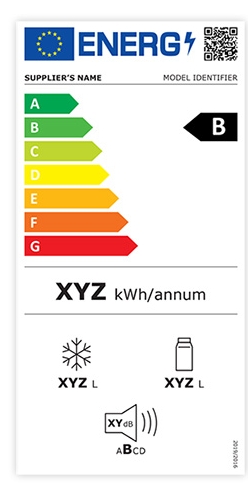Methodology
Topten.eu presents the most energy efficient minibars on the European market. Only models with classes A through C are listed on topten.eu. All listed products use natural climate-friendly refrigerants.
Technical criteria
All minibars on www.topten.eu meet the following criteria:
- Minimum energy efficiency class C
- Natural refrigerant with global warming potential (GWP) of ≤ 3 such as R290/propane or R600a/isobutane, if compression-type*
* Peltier-type (thermoelectric) minibars do not contain any refrigerant.
Data sources
Order of presentation
Products are ranked according to their energy index. The order of presentation can be changed by clicking on "sort by". Compare models by checking them and clicking on compare.
Glossary
Brand, Model, Other models
Brand with link to website, model name. Other very similar products are listed as other models.
Electricity costs
Costs for electricity during product's life time. Assumptions:
- Typical life time: 10 years
- Annual energy consumption: according to the EU energy label in kWh/year
- Tariff of electricity: 0.3 €/kWh (there however can be large differences depending on country or electrical utility)
Net volume, Gross volume
Net/gross volume in liters.
Energy efficiency class
Energy efficiency class according to the EU energy label. Most efficient is A, least efficient is G.
Energy Efficiency Index
Energy Efficiency Index (EEI) according to the EU energy label. Value in percent (%). The lower the value, the more efficient the product.
Energy
Annual energy consumption in kWh/year according to the EU energy label.
| Energy efficiency class
|
EEI
|
EU energy label
|
| A |
EEI ≤ 41 |

|
| B |
41 < EEI ≤ 51
|
| C |
51 < EEI ≤ 64
|
| D |
64 < EEI ≤ 80
|
| E |
80 < EEI ≤ 100
|
| F |
100 < EEI ≤ 125 |
| G |
EEI > 125 |
Refrigerant
- R600a (isobutane, natural climate-friendly refrigerant)
- R290 (propane, natural climate-friendly refrigerant)
- R717 (ammonia, natural climate-friendly refrigerant) - for absorption-type
Type
- Absorption: Conventional type for minibars. Silent; not energy efficient.
- Thermoelectric: Used for minibars and wine coolers. Also called Peltier-type. Silent; good energy efficiency possible, however efficiency decreases when the difference between storage and ambient temperature is high.
- Compression: Conventional type for most household and commercial refrigerating appliances. Very energy efficient; compressor makes noise, therefore installation with timer programme or presence control to ensure silence in presence of hotel guests.
Noise
- silent (if absorption-type or thermoelectric-type)
- silent through timer programme or presence detector, special cold reserve
- Airborne acoustical noise emissions expressed in dB(A) according to the EU energy label
Countries available
This item displays the availability of models in European countries according to producers’ information. "EU" means that the model is available in all or most European countries. If the model is available in a number of countries only they are indicated by country codes according to ISO. "On demand" means that producers could not indicate the availability and that consumers have to ask in their countries on their own.
Infoplus
Publications
- ProCold Publishable Report, project results 2016-2018, July 2018
- ProCold Technical Report, market overview and development 2016-2018, April 2018
- Commercial and Professional Refrigeration Products: Promoting Energy Efficiency with Legislation, Empowered Stakeholders and Rebates. Eva Geilinger, Eric Bush. EEDAL 2015, presentation and paper.
- Best available technology of plug-in refrigerated cabinets, beverage coolers and ice cream freezers and the challenges of measuring and comparing energy efficiency. Eva Geilinger, Martien Janssen, Per Henrik Pedersen, Paul Huggins, Eric Bush. EEDAL 2013, presentation and paper.
Standards and labels
Links
- Energy efficiency measures by the European Commission.
- eceee, the European council for an energy efficient economy, provides a status overview on all products in the Ecodesign & Energy Labelling process.
- Coolproducts informs about the EU ecodesign process. It is a coalition of NGOs' campaign for a stronger, fast Ecodesign Directive to save the climate and money.
- ECOS (Ecostandard) is an international NGO with a network of members and experts advocating for environmentally friendly technical standards, policies and laws.
- EPREL (European Product Registry for Energy Labelling) is the European product database. Products with an energy label are registered in EPREL in order to provide consumers with detailed product information.
Manufacturers and dealers are kindly asked to contact info(at)topten.info to inform about more products meeting the Topten selection criteria.
11/2022 Hepp, Bush
 Dometic C40S
Dometic C40S indelB K 35 ECOsmart
indelB K 35 ECOsmart indelB K 40 ECOsmart
indelB K 40 ECOsmart indelB K 60 ECOsmart
indelB K 60 ECOsmart